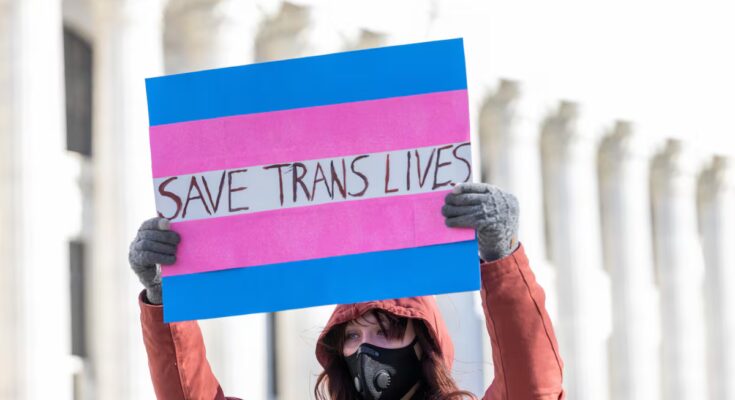The US Supreme Court has given its approval to Donald Trump’s government to require sex assigned at birth to be listed on passports. That means he supports the block so trans, intersex and non-binary people can mark the gender they identify with while the case is decided in a lower court. The decision released Thursday by the Supreme Court, with a supermajority of conservative justices, paralyzes a lower court’s order that forced the federal government to allow citizens to indicate male, female or X on their passports until there is a ruling on the matter.
“Displaying the birth sex of passport holders does not violate the principles of equality before the law any more than displaying their country of birth would; in either case, the Government merely attests to a historical fact without subjecting anyone to differential treatment,” the Supreme Court noted in a brief explanation of its order.
The high court supported the Justice Department’s urgent request to reverse an order issued by another judge to block the measure requiring passports to reflect only the sex assigned at birth until the conclusion of the class action lawsuit challenging the GOP measure.
The Supreme Court order was not signed, as is usual in decisions that the court makes urgently. However, the court’s three liberal justices expressed their disagreement with the decision. In one particular opinion, Justice Ketanji Brown Jackson criticized that the court has once again allowed the Trump administration to pursue policies that “cause harm to the most vulnerable,” on an interim basis, when the case is still being resolved in other court filings. Justices Sonia Sotomayor and Elena Kagan also joined Jackson’s writing, Reuters published.
“By preventing trans Americans from obtaining gender-congruent passports, the government is doing more than simply expressing its belief that transgender identity is false. The passport policy also invites additional, sometimes humiliating, scrutiny like the plaintiffs have experienced,” the judge explained in his brief.
A decades-long practice
Since 1992, the U.S. State Department has allowed sex markings on passports to differ from the sex assigned at birth, as long as a series of medical reports are provided. Under Joe Biden’s presidential term, in 2021 there was the possibility to choose between three categories without any type of documentation: male, female and X (for non-binary, intersex or gender non-conforming people).
“The State Department has for decades had a process that allowed trans people, and more recently non-binary people, to have documents that properly identify them. These policies have worked. There is no reason to change them except malice,” Cathryn Oakley, legal policy manager at the Human Rights Campaign (HRC), criticized in a statement. “The Trump administration’s policy has only one purpose: discrimination. It exists to make the lives of (trans, intersex, and non-binary people) more difficult, to degrade and shame them at the border, in airports, and in their daily lives,” he added.
As soon as he came to power for the second time, in January this year, Trump signed an executive order to reverse a practice that had been in place for decades. Articulated under the heading Defending women against extremist gender ideology and restoring biological truth in the federal governmentthe order establishes binarism as official US policy: “the masculine and the feminine.”
“These genders are not interchangeable and are based on a fundamental and incontrovertible reality,” the text reads. It also describes gender self-determination as a “false claim” that must be removed from all federal policies. “Gender ideology replaces the biological category of sex with a changing concept of self-assessed gender identity,” it states. The directive required federal agencies to remove all references to gender identity; Passports, Social Security documents or other official identification documents must reflect the sex assigned at birth.
Lawsuits quickly erupted in which those affected claimed that this executive order exposed them to harassment and mistreatment: “We seek what millions of Americans take for granted: passports that allow us to travel without fear of harassment and violence.”
So, while those lawsuits were being resolved, federal Judge Julia Kobick of the District of Boston ruled in April that the rule promoted by Trump could result in discrimination and that it was based on an “irrational prejudice” against trans people. Furthermore, it believes that this could violate the constitutional principles of the United States and contravene another law regulating the action of federal agencies. In June, Kobick temporarily blocked enforcement of Trump’s executive order.
“The public cannot force the government to use inaccurate sex designations on identification documents that do not reflect the person’s biological sex, particularly on documents that are government property and constitute an exercise of the president’s constitutional and statutory power to communicate with foreign governments,” Justice Department lawyers argued against Kobick’s decision. The judge refused to revoke the precautionary measure she imposed. In September the Court of Appeals confirmed the Boston judge.
Before the judicial block, the Trump government appealed to the Supreme Court, which ruled favorably. Since returning to the White House, the Republican administration has repeatedly turned to the high court after seeing its intentions thwarted by lower court judges. The Supreme Court, with a majority of conservative justices (six of its nine members), has aligned itself with the government in almost every case heard since Trump’s return.



